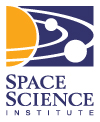Staff

James Harold
James Harold: Acting NCIL Director
James Harold is the Director of Information Systems and Technology for the Space Science Institute, and the Acting Director of SSI’s National Center for Interactive Learning. Jaime has a research background in space physics (Ph.D. in physics, Univ. of Maryland, College Park), and a long interest in the role of computers, simulations, and games in education. He has been involved in a wide range of space science education programs, including the NASA Office of Space Science Education Support Network, which sought to enhance NASA education through more effective scientist involvement and more cohesive education programs. He served as the development lead for the software components of the Alien Earths and Giant Worlds traveling exhibits and accompanying web sites, as well as the Space Weather Center website. He was Co-I on the NASA/HST funded MyStar project (a stellar evolution game); the NSF funded Hydrobot project (a 3D Hydrobot simulator game); Co-I and software development lead for the NSF funded Great Balls of Fire exhibit, PI of the NSF and NASA funded Finding NEO project (developing, among other things, a physics based asteroid deflection game); and PI of Making Space Social, which produced Starchitect, a social game for Facebook dealing with stellar and planetary evolution. He is currently Co-I for the NASA @ My Library project (funded by NASA); the Solar Eclipse Activities for Libraries (Gordon and Betty Moore Foundation), and leads the NASA Artemis focused “From Our Town to the Moon, Mars, and Beyond” library exhibit program (NASA).
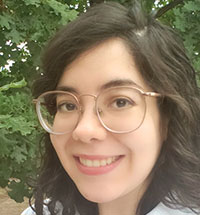
Amy Briones
Amy Briones: Graphic Designer/Illustrator
Amy Briones has a B.A. in Graphic Design with a minor in Museum Studies from the University of Texas at El Paso (UTEP). She has over 5 years of experience in graphic design, exhibit design, and illustration. Her previous experience includes working as a Graphic Designer, Preparator, and Curatorial Assistant at UTEP's Centennial Museum and Chihuahuan Desert Gardens. She designed, organized, and developed exhibits along with her team. Amy served as a panelist for the Humanities Education and Research Association (HERA) Conference and Sol Conference in 2021 where she spoke about the development of the Virtual Lhakhang Project. Her publication campaign design for Uncaged Art: Tornillo Children's Detention Camp was awarded the Mitchell A. Wilder Publication Design award by the Texas Association of Museums (TAM). During her free time she collaborated with the El Paso Museum of Art to sell her illustrations in their shop. Amy is also an avid dog lover.
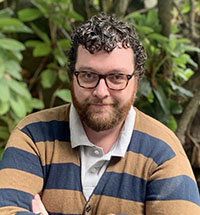
Dillon Connelly
Dillon Connelly: Education Specialist
Dillon Connelly rigorous training in informal science education began at age 5 when he convinced his parents to take him to the National Museum of Natural History in Washington, D.C. for the third time in as many weeks. Since then, he has earned an A.S. in Culinary Arts from Johnson & Wales University, a B.S. in Geology and a B.A. in Biology from the University of Rhode Island, and an M.A. in Museology from the University of Washington. Before joining the NCIL team in August 2021, Dillon contributed to studies and projects at the Seattle Aquarium, the Burke Museum of Natural History and Culture, the Roger Williams Natural History Museum and Planetarium, the Rhode Island Museum of Science and Art, and the Puget Sound Museum at the University of Puget Sound.
When not excitedly talking about science, he can usually be found with his head in a science fiction or fantasy novel shamelessly stealing ideas for his next tabletop RPG campaign or working towards his lifelong Sisyphean quest to bake the perfect macaroni and cheese.
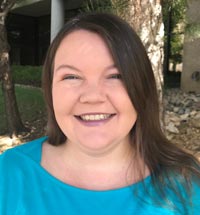
Anne Holland
Anne Holland: Senior Education Associate
Anne Holland is a Senior Education Associate with the Space Science Institute, where she has led exhibit-focused efforts for NASA, NSF, NIH and IMLS-funded projects since 2012. Holland is also the manager of the STAR Library Education Network, a group of over 10,000 library staff committed to increasing STEAM programming in their libraries. Holland is the PI of the NASA funded NASA@ My Library project, NSF funded STEAM Equity project, and SEAL (Solar Eclipse Activities for Libraries) funded by the Gordon and Betty Moore Foundation.
Anne received her B.S. in astrophysics and B.A. in English Writing from the University of Hawaii in 2009 and received a master's degree in Space Studies in 2014. Before joining the Space Science Institute, she gained informal education experience while working for the Mauna Kea Visitor Information Station, Hawaii Forest and Trail, and Denver Museum of Nature and Science. She is currently finishing her PhD in Research Methods and Statistics from the University of Denver. Her dissertation research investigates on the ground experiences of current children's librarians in relation to the formal training they received during their MLIS programs.
Book Recommendation: Murderbot Diaries "Yes, talk to Murderbot about its feelings. The idea was so painful I dropped to 97 percent efficiency. I'd rather climb back into Hostile One's mouth." - Martha Wells, All Systems Red
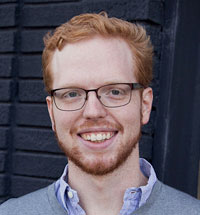
Brooks Mitchell
Brooks Mitchell: Education Associate
Brooks W. Mitchell is an Education Associate with the Space Science Institute, where he has helped lead Professional Development efforts for NASA, NSF, and IMLS-funded projects since 2017. Brooks empowers library staff and other informal educators to better engage their patrons in STEM content through workshops, presentations, papers, and more. He also combines his professional training in geoscience and communication and engagement skills to create patron-facing resources, such as exhibit pieces, interactive activities, online resources, and videos. He is currently the institutional PI for the NASA-funded Eclipse Ambassadors project.
Brooks received his B.A. in geology from the University of Alabama in 2012 and began working with informal learning institutions shortly thereafter. Before joining the Space Science Institute in 2017, he gained informal education experience while working for the Mildred Westervelt Warner Transportation Museum, Georgia Aquarium, Fernbank Museum of Natural History, About.com, and Durango Nature Studies. He received his Post Baccalaureate Certificate in Geographic Information Systems (GIS) from Pennsylvania State University in 2021 and his Masters in GIS in 2022. His Masters capstone research focuses on the effect of public library programming on academic success rates in school districts in the Mountain West region.
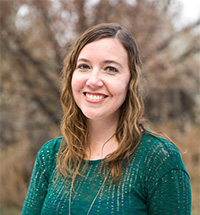
Claire Ratcliffe Adams
Claire Ratcliffe Adams: Education Associate
Claire Ratcliffe Adams is an Education Associate at the Space Science Institute, where she develops and curates STEAM resources for informal learning settings. She also leads professional development webinars and workshops for library staff across the country who are interested in incorporating STEAM activities into their programs. Claire has a M.S. in Natural Science Education from the University of Wyoming and has taught in various formal and informal learning settings for over 12 years, including teaching STEM at a k-8 public school and directing a Boys & Girls Club Teen Program. In her spare time, Claire enjoys hiking, gardening, and reading fiction novels.
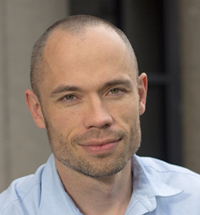
Evaldas Vidugiris
Evaldas Vidugiris: Senior Developer
Evaldas is a graduate in studio arts from the University of Colorado in Boulder with a certificate in Technology, Arts and Media (2003). He joined the Space Science Institute in 2002 and has been the primary programmer for a wide variety of interactive activities and games for NASA and NSF funded projects, including MarsQuest Online, Alien Earths, Giant Worlds, the Space Weather Center, Hydrobot, Great Balls of Fire, and Finding NEO. In addition to development tools such as Flash and Director, his expertise in PHP has allowed us to develop online activities which track user interactions for later evaluation. He also has experience developing interactives in the Unity environment.
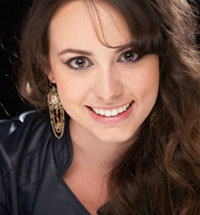
Stephanie Vierow-Fields
Stephanie Vierow-Fields: Education Associate
Stephanie is an Education Associate at the Space Science Institute, where she works with library professionals and project partners on federally and privately funded projects that bring STEAM learning to library patrons, provide professional development to library staff, and curate communities of practice for nationwide public library staff. In addition to her undergraduate academic background in anthropology and theatre arts from the University of Northern Colorado, Stephanie also has a MA in Archaeology for Screen Media from the University of Bristol (UK). She uses her academic and professional experience to communicate technical ideas and concepts in easy-to-engage formats that can be enjoyed by all audiences.
Emeritus
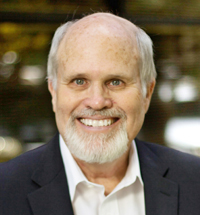
Paul B. Dusenbery
Paul B. Dusenbery: Former NCIL Director
Paul received his B.A. in Physics from Whitman College in 1972 and his Ph.D. in Physics in 1978 from the University of New Hampshire specializing in space plasma physics. He was a Research Associate at the University of Colorado, Boulder from 1982-1990. In September of 1989, he became the Program Director of the Magnetospheric Physics Program at the National Science Foundation.
In October 1992, he was appointed Executive Director of the Space Science Institute (SSI), a nonprofit research and education organization, located in Boulder, Colorado. In 2010, SSI’s Board of Directors appointed him Director of the National Center for Interactive Learning. In June 2014, he stepped down as Executive Director to devote full time to directing NCIL. From 1995-2004, he led the development of a successful workshop series for scientists and engineers to learn how to implement effective formal and informal STEM education programs. He was the project director and led the development of major national traveling exhibitions: Electric Space, Space Weather Center, MarsQuest, Destination Mars, Alien Earths, Giant Worlds, and recently Great Balls of Fire: Comets, Asteroids, and Meteors. He has also led and participated in numerous professional development workshops for classroom teachers, science museum educators, and library staff. Currently, he directs the national library education program called the STAR Library Network (STAR Net), in partnership with the American Library Association and many library and STEM education organizations. The STAR Net program includes traveling STEM exhibitions, activities and training for librarians, an outreach program in partnership with the Afterschool Alliance, a community of practice for librarians and STEM professionals, and evaluation and research. Several projects are part of STAR Net: Discover NASA, NASA@ My Library, and Project BUILD. STAR Net is supported by a number of sources: NSF, NASA, NIH, and IMLS. He was also the PI and project director for the first Public Libraries & STEM Conference in Denver, Colorado in August, 2015. This NSF-funded conference brought together 160 leaders from both the public library and STEM education communities to help define a new 21st century vision of STEM learning in public libraries.

